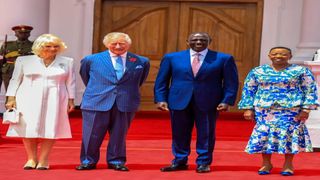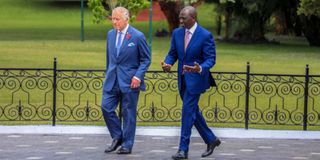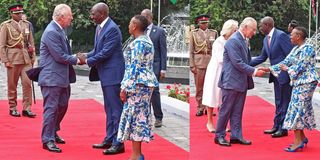
President William Ruto, Britain's King Charles III, First lady Rachel Ruto and Queen Camilla at State House on October 31.
| Dennis Onsongo | Nation Media GroupWeekly Review
Premium
Royal etiquette: What not to do when the King and Queen are around
King Charles III and Queen Consort Camilla are vising a very different Kenya. Virtually all the vestiges of British rule are gone.
When Charles Njonjo died in January last year, he was interred with everything that personified British traditions and sensibilities. The King would have found a perfect company, a namesake and a man with whom they share many things in common.
One day in Nanyuki, I was in the company of media colleagues heading to Dol Dol to cover the annual Rhino Charge, an off-road four-wheel drive vehicle event, which is more of show of might and glamour among the Kenyan propertied and moneyed class than any serious motorsport contest. While seated inside a banda of a fairly nice hotel for a well-deserved break, a group of boys – three white and one half-cast – dressed like any ordinary folks, but speaking with a slightly upper-class twang, sauntered inside and settled around a table.
They were followed by some crew-cut casually smartly-dressed ramrod two white guys in dark glasses, who settled on a not-too-distant table, but strategically positioned to shadow the boys’ table.
I happened around their table, after visiting the washrooms, and one of them remarked about a Kenyan cricket jersey I was wearing (at the time, Kenyan cricket was trying to invade the space occupied by the exclusive Test club). I acknowledged his compliments, but did not take too much notice of anything else, possibly flattered by the appreciation from a young man.

Britain's King Charles III and President William Ruto at State House, Nairobi.
Within 10 minutes, the boys left as casually as they had come in, again followed by the two white men. Then word leaked around that it was Prince William and Njonjo’s son with their friends, whose parents occupy huge swathes of land around Mount Kenya. These were school mates (in the UK) on holiday, so-called gap period, enjoying the sun in Kenyan countryside.
Not quite like Sandringham Estate in the English county of Norfolk, which houses the Royal Station, but why not have a jaunt in a country which had lots of sentimental attachment to grandmother, the Queen Elizabeth II.
Media colleagues were a tad too late for soundbites and pictures. No one even knew where they headed. “Ooh, my God! How did we miss that page one picture, a world exclusive?” John Thuo, media fixer for Rhino Charge, cursed. We were stewing in our frustration for the rest of the trip to Dol Dol. Subsequent enquiries by the team with the High Commission about the presence of the future king in Kenya were met with the traditional “no information about the royal presence (in the country)”. End of story.
That is the camaraderie Njonjo had with the royal family that King Charles III will dearly miss. President Daniel arap Moi, another royal family’s alter ego, who even named his twin children Philip Kipchirchir and Doris Elizabeth Chepkorir after the late Duke of Edinburgh (Philip Mountbatten) and Queen Elizabeth II, went to be with the Lord in February 2020. Richard Erskine Frere Leakey, the scion of the famous archaeology family of Louis and Mary Leakey, who described himself as paleoanthropologist and conservationist, and who was appointed by Moi to be the top bureaucrat, died the same month with Njonjo (January 2022).
Uncle Moody Awori is down with poor health and not in government, while Kijana Wamalwa, famed for his proper pronunciation of English, is also gone. King Charles III will miss good company in a country where everything good was seen with the lenses of British sensibilities – from Land Rover vehicles to Kenya Bus Service, London taxis, to Lonrho conglomerate, then owned by Tiny Rowland. The folks who displayed exquisite and aristocratic sartorial elegance with products from Saville Row are long gone.
Perhaps, journalist-turned-ambassador Manoah Esipisu (our man at the Court of St James) and the King’s representative in Nairobi have flown in some tail coats for use at the House on the Hill for the distinguished gentlemen. Ladies must prepare to observe strict fashion and style protocol that befits the royal couple. No pant suits here. That will be against the dressing etiquette. Hats will do very well for them. The First Lady must have taken curtsy lessons for the occasion.

The First Lady must have taken curtsy lessons for the occasion.
The Nairobi Club gentlemen of the era of Job Omino would have found a friend of theirs in the King. But, alas! Most of these guys are long gone.
King and the Queen Consort
Among the dignitaries to receive the King and the Queen Consort will be a governor of the capital city who neither plays polo, nor savours jazz and does not quote Shakespeare and Charles Dickens, among the greatest play writes and novelists of the Victorian era, whose stories still spice up dinner at royal and high society events to-date. When the royal couple decide to go for sports events, they will be received by a minister who dresses more like a musician than an overseer of government policy. And that brings me to an area the royal couple may find some like-minded company. You see, that is the power of sports.
The King may find something to look forward to in polo, the king of sports. It’s not lost on royal watchers that King Charles III was an avid polo player, a sport he bequeathed to his rebellious son, Prince Harry. Moi’s grandsons, Kimoi and Kigen, and their father, Senator Gideon Moi, should invite the royalty to Manyatta Polo Club in Gilgil to have a fun-filled afternoon there. But the place where the royal couple will find real stuff is Timau.
Timau is a back-water place near Mount Kenya, hardly ever heard of outside Central Province, but it is where some of the best cut flowers are grown and exported to Europe almost on a daily basis. There is a small close-knit white community here, which owns thousands of acres of land, which they utilise so professionally one would wonder whether this is Kenya or somewhere in Europe. They even have their own water supplies and produce their own electricity. Their farms have airstrips and helipads. Some families fly their children to schools in Nairobi using helicopters. They attend Banda, Peponi, Pembroke House, from where they proceed to colleges in the UK. One weekend at a polo event in Gilgil, I overheard a phone conversation between a member of Manyatta and a polo fan who wanted to come, and was enquiring about the situation. Well, he was told that all helipads were occupied, so there was no need to come. When I counted, they were around 15 choppers parked there majestically.
If you are still wondering whether I am talking about events taking place in Kenya, better visit places like Lewa and Timau. Timau is where serious economic activities, of agricultural and floricultural kind, are happening. The royal couple will be in good company there if the Grosses – Anthony and Rowena – are ready to step into the space Njonjo left. The Voorspuys, Tristan and Cindy, should be handy to lead the couple to experience the local polo scene and the exquisite muzungu hospitality there.
Hiromi and Jadini Nzomo, Kimoi and Kigen Moi will complete the line-up for a friendly polo match that they king should find worth whiling away time at. After all, Timau is not too far from Tree Tops where the then young Elizabeth Alexandra Mary Windsor and Philip Mountbatten were honeymooning with Philip when her father, King George VI, died and her world suddenly turned into what she had not bargained for.
Prince Harry used to play polo in the same team as Rishi Ahluwalia, son of Kenyan businessman Ashe and Kiran Ahluwalia, during his student days in the UK. His sister, Amber, is a refined polo player from her student years in Cheltenham in the UK. Horse racing is no longer where it was during the height of British socio-economic presence in Kenya, and thus may not offer the Royal couple good sporting entertainment.
Many years ago, horse racing was where the British white community showcased their presence in Kenya. I still recall the Limuru Gymkhana with nostalgia. It was held on December 26 every year and it was so big that riders would fly in from Britain. British companies in Kenya would fall over one another to get sponsorship space and hospitality boxes on the podium.
It was an event Lonrho-owned companies used to show their might – Toyota Kenya, Norfolk Hotel, East African Tanning and Extracting Company (EATEC), among others, displayed their products therewith pomp. The British High Commissioner led his staff there in sampling the great Kenyan hospitality. In all, the King will find a very different Kenya, away from what the face of British capitalism epitomised in the last century.




